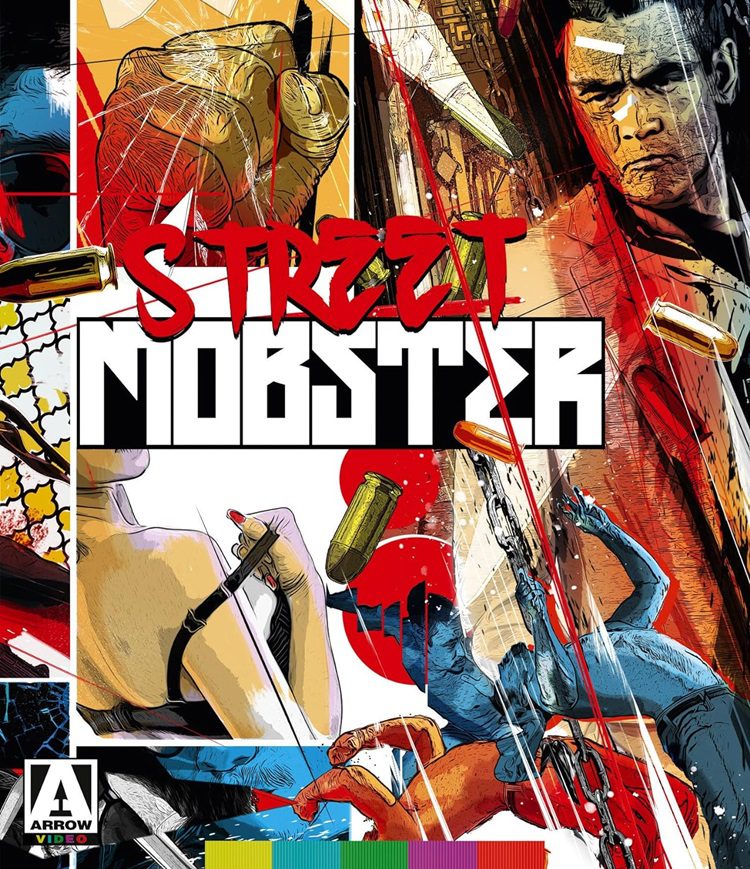
Street Mobster is a rough, often ugly story about Okita, a common street thug who tries to eke out a living as a low-level yakuza, but whose temper and inability to kowtow to his bosses lead him to disaster. He’s not a gallant rogue or a tragic figure. His father was killed in the war; his mother was a whore who walked drunk into a river and was fished out dead the next day. He turned to crime as soon as he was capable, and one of his jobs was grabbing country girls who’d just moved to the city and selling them to brothels, after raping them for good measure. He’s a nasty piece of work.
Okita is played by Bunta Sugawara, who for Japanese cinema fans is the face of the “modern” Yakuza movie. Street Mobster is the first time he worked with Kinji Fukasaku and their next project was the ground-breaking Battles Without Honor and Humanity. That series of realistic crime movies based on real yakuza stories began in 1973 and did away with romanticized, heroic figures that populated earlier yakuza films. The older style films, called Ninkyo Eiga (“Chivalry films”) certainly had evil yakuza characters, but their perfidy was not in the crimes they committed, but in being treacherous to other yakuza, or disloyal to their bosses. The heroes were the men who would perform their duty regardless of the personal cost, and strike out against the yakuza that betrayed the code.
That’s a lot of larding up of what were basically stories of street thugs muscling in on businesses and having knife fights. In the ’70s, grittier yakuza films with a much lose rosy depiction of criminal gangs became in vogue. The genre (Jitsuroku Eiga, “Actual record films”) achieved critical and commercial ascendance with the aforementioned Battles Without Honor and Humanity, which was five movies and a second series of three movies a year later, initially based on the actual accounts of gangsters in post-war Japan. The veneer of duty and honor were revealed as a cover for duplicity, treachery, and cowardice. Bunta Sugawara plays a yakuza who is more like an old movie yakuza than any of his counterparts, which consistently leaves him marginalized, used, betrayed, and shoved to the side rather than rewarded for his loyalty.
The style of that series of films – documentary realism, fast-action, handheld shots and choppy editing – was given a dry run here in Street Mobster, also directed by Kinji Fukasaku. It looks less refined here, even rougher than it does in Battles, the first of which was released just six months after Street Mobster. And while the opening credits of the film assure us that Street Mobster is fiction and not based on real accounts, it has the tone of realism that is carried through and makes Battles such a compelling series.
Street Mobster I found less compelling, partly because the plot is rather rote, and partly because Okita is an awfully unsympathetic protagonist. We follow his life after a stint in prison, where he went after he cut up a bunch of yakuza bosses in a bath house. He returns to the streets and tries to keep doing the same old criminal crap he grew up doing. The difference is the yakuza now have tighter control over the area, and eventually Okita and the gang he used to run with have to join one yakuza family or another.
There’s the usual yakuza shenanigans of fights in bars, using women, and occasionally somebody getting stabbed or, more rarely, shot. Street Mobster also features a twisted love story where Okita reunites with Kimiyo, one of the girls he’d raped and sold to a brothel. She tries to stab him, but when that doesn’t work out, they hook back up in the abandoned building where they first met. Very sweet.
Okita is untamable, and though he’s in the yakuza world, he’s not of them. When he insults a boss, he refuses to do the honorable thing, and apologize and cut off a pinky. Conflicts escalate until the inevitable bloody final conclusion. Street Mobster is not constant debauchery, just nearly. It’s interesting to see this initial foray into the style that would characterize a lot of Fukasaku’s best work in the ’70s. For a completest, it is of course necessary, but for me it serves just a precursor to his masterworks, the Battles Without Honor and Humanity series. On its own Street Mobster is an interesting take on a genre, but not a full-throated game changer.
Street Mobster has been released on Blu-ray by Arrow video. Extras include a full-length commentary by Tom Mes which, among other topics, covers the history of the yakuza genre and about Fukasaku’s importance in changing it, an essay by Jasper Sharp in the accompanying booklet, and the film’s trailer.